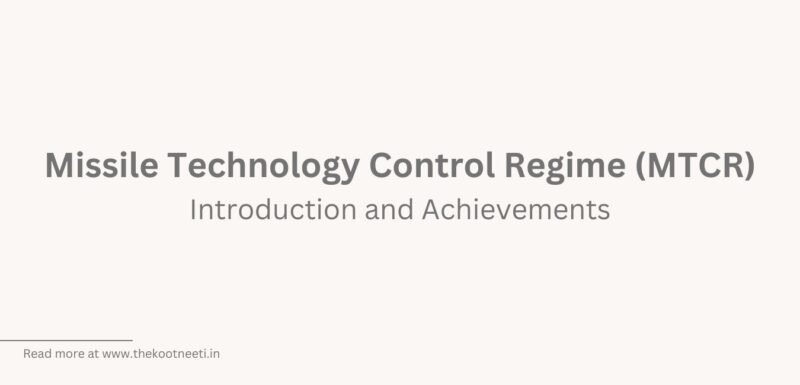Missile Technology Control Regime (MTCR): Introduction and Achievements

The Missile Technology Control Regime (MTCR) is an international export control regime that aims to prevent the proliferation of missile and unmanned aerial vehicle (UAV) technology that could be used for military purposes. It was established in 1987 by a group of countries including the United States, Canada, France, Germany, and the United Kingdom, and it now has 35 member countries. The MTCR is not a formal treaty, but rather a voluntary partnership among its member countries. The MTCR establishes guidelines for the export of missile-related technologies and materials, and it works to coordinate export controls among its member countries to prevent the proliferation of missile and UAV technology. The MTCR also engages in activities to promote the peaceful use of missile and UAV technology and to support international efforts to combat the proliferation of weapons of mass destruction.
MTCR achievements
The Missile Technology Control Regime (MTCR) has achieved a number of successes in its efforts to prevent the proliferation of missile and unmanned aerial vehicle (UAV) technology that could be used for military purposes. Some examples of the MTCR’s achievements include:
- Strengthening export controls – The MTCR has established guidelines for the export of missile-related technologies and materials, and it has worked to coordinate export controls among its member countries. This has helped to prevent the proliferation of missile and UAV technology to countries or organizations that may use it for military purposes.
- Promoting peaceful uses of missile and UAV technology – The MTCR has engaged in activities to promote the peaceful use of missile and UAV technology and to support international efforts to combat the proliferation of weapons of mass destruction. This has helped to encourage the development of missile and UAV technology for peaceful purposes, such as disaster response, environmental monitoring, and scientific research.
- Supporting international non-proliferation efforts – The MTCR has supported international efforts to combat the proliferation of weapons of mass destruction, including through the development of technical standards and the provision of technical assistance to countries seeking to strengthen their export control systems.
- Encouraging the adoption of export controls by non-member countries – The MTCR has encouraged non-member countries to adopt export control measures that are consistent with the MTCR guidelines, and it has provided technical assistance to countries seeking to establish or improve their export control systems. This has helped to expand the reach of the MTCR and to strengthen global efforts to prevent the proliferation of missile and UAV technology.
India and MTCR
India joined MTCR as a full member in 2018. India’s membership in the MTCR was seen as a significant achievement for the country, and it was expected to enhance India’s credibility in the international community and facilitate cooperation with other MTCR member countries on non-proliferation issues.
India formally applied for membership of the group in June 2015 in an effort to integrate itself with the global nuclear energy market.
India had been making efforts to be in the grouping since 2008 when it signed the Civil Nuclear Deal with the US. In 2011, America removed India from its previous inclusion in the Entity List of several country groups under the Export Administration Act (EAA), and elevated India out of the categories within the dual use regulations.


















